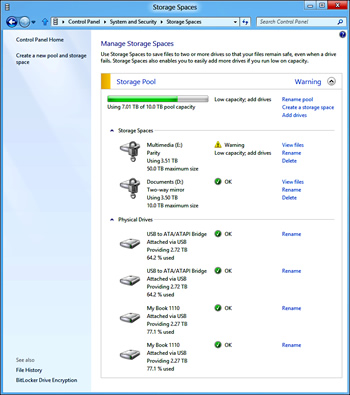
An interesting article has been posted to the MSDN blog, thoroughly outlining a new Windows 8 feature called "Storage Spaces". The technology will allow users to create a single storage volume from multiple storage devices. The feature also allows users to dynamically expand a Storage Space volume by adding more devices on the fly. Storage Spaces affords users this freedom by cleverly organizing used and free space across NTFS volumes.
For example, Windows 8 users will be able to lump together any mixture of storage devices into a single volume that appears as D:\. If a user gets low on space, they can simply pop in another hard drive or plug in another external drive and Storage Spaces will expand D:\ to include the new device. More importantly, it does this without losing data.
Storage Spaces allows NTFS-formatted devices to be combined into "pools" and broken apart into "spaces". Pools are collections of storage devices that work similarly to JBOD RAID arrays (just a bunch of disks) while spaces are more analogous to partitions. Unlike JBOD arrays though, the feature also protects your data from drive failure. Similar to RAID 5, Storage Spaces utilizes parity data to provide a fault tolerance strategy.
Although they share a lot of common ground though, Storage Spaces is not a RAID solution. TheFAQ states:
Fundamentally, Storage Spaces virtualizes storage in order to be able to deliver a multitude of capabilities in a cost-effective and easy-to-use manner. Storage Spaces delivers resiliency to physical disk (and other similar) failures by maintaining multiple copies of data. To maximize performance, Storage Spaces always stripes data across multiple physical disks. While the RAID concepts of mirroring and striping are used within Storage Spaces, the implementation is optimized for minimized user complexity, maximized flexibility in physical disk utilization and allocation, and fast recovery from physical disk failures. Given these significant differences in objectives and implementation between Storage Spaces and traditional inflexible RAID implementations, the RAID nomenclature is not used by Storage Spaces.
Currently, hardware and software technologies which offer similar benefits do exist, such as LVM, ZFS, Drobo, higher-end RAID controllers and so on. However, Storage Spaces appears to offer a great deal of flexbility and simplicity, simultaneously. The feature is, at the very least, a huge improvement over the current implementation of "Dynamic Disks" found in Windows.
Storage Spaces will effectively be the "consumer" version of Drive Extender, a deprecated feature of Windows Home Server. However, the blog points out it is not intended to be a feature-by-feature replacement and is incompatible with existing Drive Extender volumes.
No comments:
Post a Comment